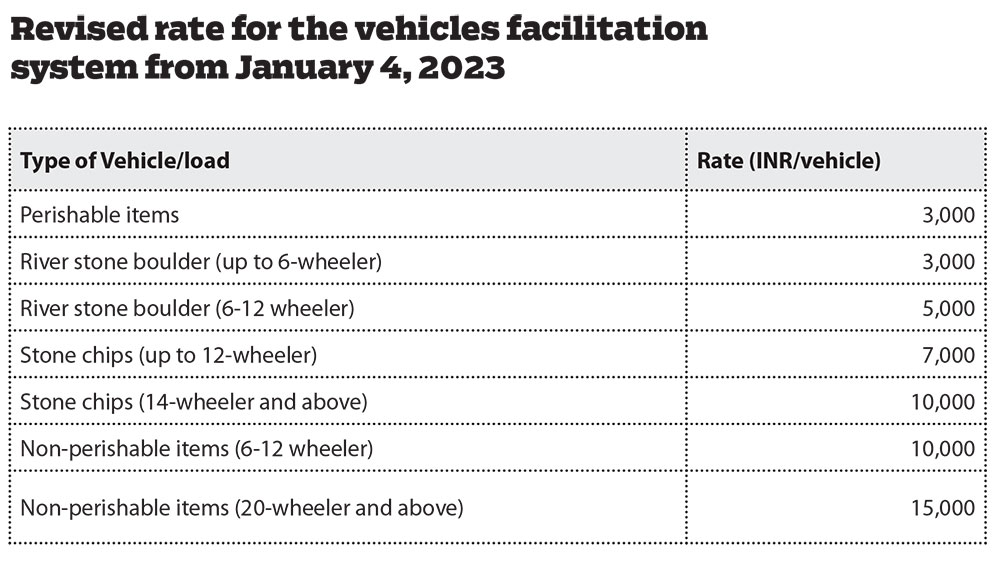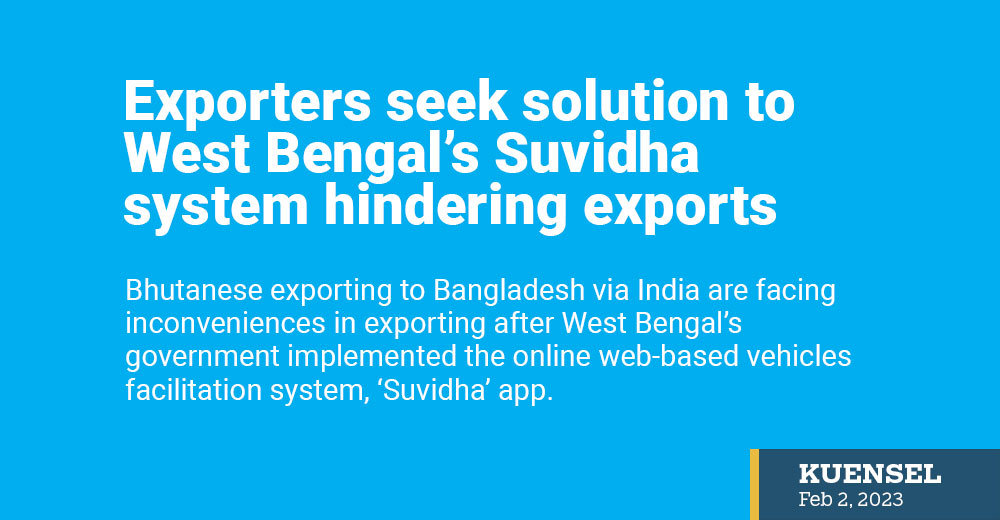Thukten Zangpo
Bhutanese exporting to Bangladesh via India are facing inconveniences in exporting after West Bengal’s government implemented the online web-based vehicles facilitation system, ‘Suvidha’ app.
On January 4, the West Bengal government revised the fee for the Suvidha system from the uniform rate of INR 2,000 to INR 10,000 for non-perishable goods, INR 5,000 for boulders and INR 3,000 for perishable goods at the Changrabandha land custom station (LCS).
Among the three LCS used by Bhutanese exporters to carry goods in both Bhutanese and Indian registered trucks, the system was implemented in Changrabandha LCS on September 26 last year.
Since the upward revision in the fees, exports of many products to Bangladesh from Phuentsholing have been stopped completely, except for river boulders, as they have to fulfil the dispatch commitments to complete their letter of credit.
“The Suvidha system is not feasible for Bhutan,” General Secretary of the Bhutan Exporters Association (BEA), Tshering Yeshi said, adding that the new requirement has increased the cost of export heavily.
“It will not be viable for many Bhutanese exporters to continue trading with Bangladesh,” he said.
Tshering Yeshi said that supposing an export of a 10-wheeler truck with a carrying capacity of 16.5 metric tonnes (MT) of boulders will fetch Nu 25,080 in Bangladesh, given the exchange rate of Ngultrum to USD at Nu 80.
However, he added that after the cost of transportation of Nu 19,800, Nu 200 as a weighbridge charge, Nu 150 as custom documentation, driver charge of Nu 163.37 per MT, and operating cost of Nu 100, exporters are left with only Nu 2,134.
The BEA also wrote to the Prime Minister on January 17 this year to take up the issue with the authorities concerned.
As per their submission, it stated that an additional cost of complying with the new requirement is almost equal to the cost of the export materials being transported in a truck which is beyond anybody’s limit to absorb.
“Bhutanese exporters are not able to compete in the Bangladesh market as the importers would not agree to absorb the extra cost. The importers determine the rate as they have more than one option,” it added.
An exporter said that if the charges for the Suvidha system is a fee to facilitate an efficient, fast and convenient system for transit at the LCS with Bangladesh, as claimed by the West Bengal government, and not a duty or a tariff, then a flat fee (irrespective of the type of vehicle or nature of goods) as initially applied for Bhutanese vehicles is more relevant.
Requiring Indian SIM cards to register on the App to book slots is another hassle, Tshering Yeshi said. “Without access to the SIM cards, 70 percent of the trucks used by truckers are Indian-registered trucks.”
Since last month, 31 Bhutanese-registered vehicles are still stranded at the Changrabandha border because of registration issues.

Tshering Yeshi said that the exporters were exhausted at their level to address the never-ending en-route problems and now with ‘Suvidha’ app.
“It is high time that the government intervened and acted faster to help the traders. We are talking about the country’s economic recovery, on the other hand, neglecting the bigger challenge that is hindering exports,” he added.
According to the Prime Minister’s Office (PMO), the government has asked the Bhutanese Consulate General office in Kolkata to take up the issue of ‘Suvidha’ fees and challenges or barriers faced by the exporters in transit with the West Bengal government and to resolve it as soon as possible. “PMO is closely following up with the Consulate Office.”
The PMO official also added that the prime minister is in touch with the individual exporters to come up with solutions.
Trade agreement
Bhutan and India have a trade agreement, “Agreement on Trade, Commerce and Transit between The Royal Government of Bhutan and The Government of the Republic of India 2016,” signed on November 12, 2016.
The Article V of the agreement states, “All exports and imports of Bhutan to and from countries other than India will be free from and not subject to customs duties and trade restrictions of the Government of the Republic of India.”
The applicability and the imposition of the Suvidha system contravene the agreement, stated the EAB.
“The concept of free trade and commerce between the two countries since Bhutan’s exports to and from countries other than India, free from customs duties and restrictions imposed by the Indian government, stand defeated,” it added.
Vehicles facilitation system-Suvidha
The West Bengal government started the Suvidha online web-based system as an initiative for quick clearance and smooth movement of vehicles through various integrated check-posts (ICPs) on the Indo-Bangladesh border.
Any exporter ferrying goods to Bangladesh has to register in the system from eight Land Customs Stations (LCS), including Jaigaon, Changrabandha, and Fulbari, which are used by Bhutanese exporters for trading with Bangladesh.
Each slot booking was charged INR 10,000 initially to use the system, after the appeal from the Bhutanese exporters, it was reduced to INR 2,000 per slot (irrespective of the type of load or the type of vehicle).
Tshering Yeshi said that the exporters accepted the system earlier because exporting to Bangladesh without registration was a hassle. “It would take a minimum of 30 days for a consignment to enter the Bangladesh border although it is a distance of about 4-hour drive.”
An exporter said that while the system is currently being implemented at the West Bengal-Bangladesh border, the West Bengal government has plans to introduce a similar system for charging goods carrying trucks entering Bhutan through entry points in West Bengal.
“This will increase the cost of goods across Bhutan as 80 percent of our imports come through Phuentsholing,” he added.
According to the Suvidha website, the West Bengal government plans to roll out the system across all of West Bengal’s international borders, including Bhutan and specifically ICP in Jaigaon.


